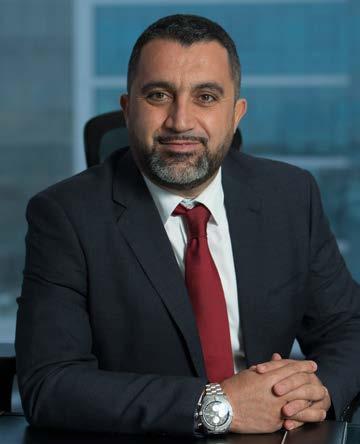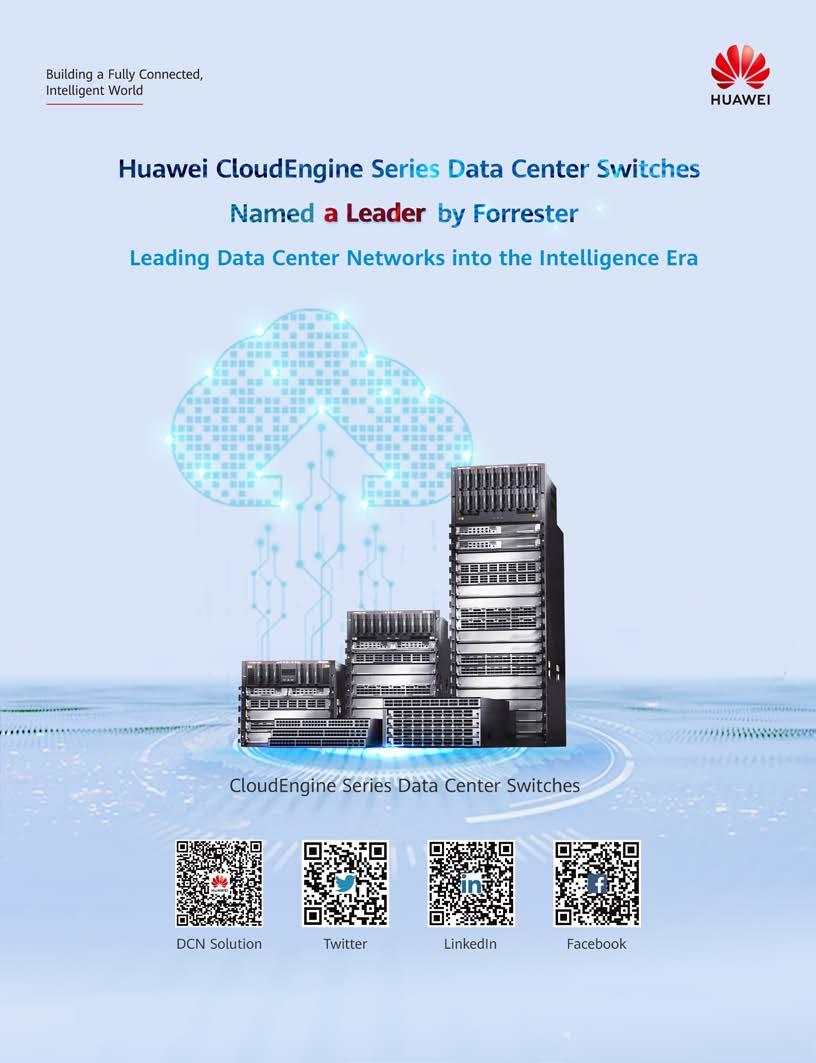
16 minute read
JP Morgan
JP MORGAN PRIVATE BANK TRANSFORMING FINTECH
David Stubbs, Head of Market Strategy & Advice at JP Morgan Private Bank has penned a detailed op-ed which takes an intrinsic look at the impact digital transformation has had on the already burgeoning FinTech sector.
David Stubbs
Head of Market Strategy & Advice at JP Morgan Private Bank I n a thought-provoking feature, Stubbs highlights the rapid increase in e-commerce as consumers spending habits continue to evolve in an era being termed the ‘on-demand’ digital economy, where the potential opportunities are, and projects we will see more disruption in the industry in 2021.
For years, cash transactions were favored by consumers worldwide, as 75% of them conduct most of their transactions in cash.
Physical payments were deemed secure and reliable, and e-payments were deemed as a back-up and last resort. Even though this notion began to shift a few years back, it was the year 2020 that caused a major change of hearts.
This year, 71% of consumers in the UAE reported an increase in using digital payments, even when shopping instore. For good reason, digital transformation has reached the financial industry and a FinTech revolution is surely on its way.
According to MaGNiTT, the UAE emerged as the largest FinTech hub in the Middle East and Northern Africa (MENA) region with a total of $237M invested in 181 deals between the period of 2015-2019.
Today, and as the world defines a new normal, the FinTech industry is preparing to benefit from the virtual lifestyle we have had to adopt. Regionally, the UAE is poised to reach a record-high of USD2.5/- billion by 2022, taking pole position in the Fintech market according Clifford Chance Report.
What is FinTech, exactly?
Financial technology is the umbrella term for products and services that use the internet, software, mobile devices, or cloud capabilities to enable individuals, businesses, governments, and others with anything money related. The technology is being used in crowdfunding platforms, cryptocurrency, mobile payments, insurance, and stocks.
Where are the potential opportunities?
As financial services are transformed, new business models are generating significant growth. Consider, for example, the state of electronic and contactless payments, digital banking, and artificial intelligence (AI)-based insurance solutions.
Having a tech-savvy population, the UAE thrives on digital advancements and novel technologies. So it is no surprise that cashless payments are on the rise across the country, and Fintech investments are catching headlines.
According to Dubai International Financial Centre, 50% of the Middle East, Africa and South Asian (MEASA) population have limited or no access to financial services. This provides a promising opportunity to provide these fast-growing markets with

an easier and more accessible banking option – such as digital banking and financial technologies.
Offering digital banking solutions to markets where physical bank branches are scarce or hard to reach, or banking without a minimum account balance is an opportunity worth exploring.
More FinTech growth and disruption on the way
Digital transformation is a megatrend across the globe that already has disrupted financial services—but even more disruption can be expected. Worldwide, we have been moving away from the statusquo of finance and towards exciting transformation. It would be worth exploring investments in the FinTech industry as growth is certainly on the way.
A10 NETWORKS TRUST NOBODY
A10 Networks, a global leader in cybersecurity, this month hosted a virtual roundtable with the aim of discussing the benefits of implementing a Zero Trust policy in the current threat landscape. The online event was hosted in partnership with CPI Media Group and was attended by IT decision-makers from around the UAE.
A10 Network’s online event and discussion was attended by technology leaders from key industries in the region. Executives from A10 Networks highlighted the need to adopt Zero Trust policies, as well as its importance in maintaining compliance as regulations continue to develop in the MENA region and around the world.
Adil Baghir, Senior Pre-sales Consultant, A10 networks took the screen as the day’s featured speaker and was joined shortly after by A10 executives Ehab Halablab, Regional Sales Leader, and Hasan Darwish, Regional Sales Manager for an interactive panel discussion.
“We are seeing many of our customers investing heavily in their IT security infrastructure. However, attackers are still taking advantage of a blind spot to take advantage of organisations and compromise their networks,” said Baghir, referring to bad actors who actually leverage TLS encryption against enterprises to conceal malware delivery, eavesdrop on communications, and exfiltrate data undetected.
The fact that cybercriminals are actually leveraging the encryption designed to protect networks, leaves IT professionals with a choice: either encrypt traffic and risk threats from bad actors that can take advantage of the TLS blind spot, or leave traffic unencrypted, which is both a security risk and oftentimes a compliance violation.
In his overview of the cybersecurity threat landscape today, Baghir noted some startling statistics. “We are seeing a 650 percent increase in trojan-based malware threats,” he said, “and the average cost of a data breach today is USD $3.92 million.” A number of these attacks, warned Baghir, are enabled by internal threat actors.
The impact of these threats can be devastating, Baghir went on, and can result in lost revenue, investigation costs, and brand damage. Noncompliance with regulations like GDPR, for example, could result in fines and sanctions that could severely affect an organisations mission and bottom line.
Ransomware is particularly insidious, as internal threat actors are not always aware of the damage they cause, explained the executive. “This could be a normal employee or anyone

Adil Baghir
Senior Pre-sales Consultant, A10 Networks

who has access to your network, including remote workers,” he said, noting the growing pool of remote workers since the start of the COVID-19 pandemic.
To solve these security issues, A10 Networks advises organisations to take on a Zero Trust model. A Zero Trust model is built on the axiom “trust nobody.” In a Zero Trust model, networks are redesigned into secure micro-perimeters and user privileges are limited. This allows for increased visibility into users, data, and workflows, as well as improved detection and response times through analytics and automation.
Existing security solutions, said Baghir, are inefficient, expensive, and complex. “These systems can be costly, and not purpose-built, need an inflexible deployment that can be disruptive, and often have difficult operationalization.” Clearly, a fresh look at cybersecurity is needed to address today’s evolving cyber threats.
To this end, A10 Networks offers its SSL Insight solution. With SSL Insight, A10 leverages hardware ASICs, which are much faster at decryption and reencryption, to offload the security responsibility from enterprise devices. This allows devices across organisations to benefit from centralised decryption with hardware ASIC acceleration.
With so many security vendors on the market, A10 Networks differentiates itself
in myriad ways. They offer a flexible deployment model that can accommodate most network designs, they remain vendor agnostic, provide full proxy architecture, and for high-security environments like government organisations, they provide Hardware Security Module support. Additionally, A10 Networks supports Dynamic Port Inspection and ICPA protocols.
A solution of any kind is only as powerful as its ability to be deployed and integrated into existing infrastructure. “The solution can also be integrated seamlessly into any network as a Layer 2 or 3 device,” Baghir assured the attendees. “It can also be deployed as a transparent proxy. It can be easily integrated with any kind of proxy deployment.”
Following Baghir’s presentation, A10 executives Ehab Halablab, Regional Sales Leader, and Hasan Darwish, Regional Sales Manager for joined the discussion to navigate practical implementation questions from the event’s attendees.
Halabab concluded the discussion by underlining the importance of end-user awareness. “Zero Trust attempts to fix the problems and patch the holes associated with current cybersecurity strategies. At the core of it, Zero Trust is, of course, trust nobody. Employees may not even know that they are causing damage, so there needs to be a dedicated program to increase employee awareness,” he said. This is particularly true, the executive noted, this year as organisations implement remote and hybridremote working models.
HUAWEI HUAWEI CLOUD IS CREATING GLOBAL OPPORTUNITIES
In an exclusive op-ed, Omar Akar, Regional Vice President and Managing Director, Cloud and AI Business Group, Huawei Middle East, highlights how Huawei Cloud is paving the way for a vast array of global opportunities in the IT ecosystem.
Cloud computing is booming. The changes in the technology landscape have allowed it to flourish and become a key part of corporate IT strategy alongside some of its more advanced technologies such as AI and IoT.
The ability to connect to a wide range of data sources across the internet in a fraction of a second was unthinkable a few years ago. The technology is now so well embedded that cloud-based operations are a cornerstone for tens of thousands of companies across the world, spearheading their growth and expansion process.
Omar Akar
Regional Vice President and Managing Director, Cloud and AI Business Group, Huawei Middle East

Huawei is playing a key role in the growth of cloud computing, building an ecosystem to include partners of different types to examine innovative ways to deploy cloud technology.
The growth of cloud is driven by the rapid increase in Internet usage worldwide according to Mark Chen, Director of the International Business Department at Huawei Cloud. The number of Internet user exceeds 380 million in the Middle East and North Africa, 480 million in Southeast Asia, and 450 million in Latin America.
Despite these numbers, there are still vast opportunities to be explored. Huawei Cloud is leveraging its technical edge, its knowledge, and partner programs to provide support for internet companies that want to take advantage of the opportunity.
Gaming firm NetEase has also been able to expand rapidly thanks to the robust cloud services Huawei provides. NetEase-produced online game “Conqueror’s Blade”, which runs entirely on Huawei Cloud nodes outside of China. Such cloud service nodes are also deployed in Latin America to provide network coverage there.
Huawei’s services are used across the world. Huawei has deployed more than 2,500 content delivery and POP nodes across the globe along with 45 availability nodes delivering 210+ advanced services to accelerate digital transformation of all industries.
Huawei is also proud to announce that these services will be launched in the Middle East this November.
While these are just some of the many successful stories, Huawei looks to provide partners with even more assistance both financially and technically under its HMS Ecosystem Support Program. Incentives include development and testing coupons plus cloud resources and migration tools.
CNS MANAGED SERVICES
Hatem Hariri has established himself as one of the most prominent thought-leaders in the IT ecosystem, and in this op-ed the Managing Director at CNS, outlines some of the differentiating factors that separate the IT leader from its market rivals.
Hatem Hariri
Managing Director at CNS

Today’s business leaders tend to overlook the competitive advantage of a digitalised enterprise, but astute enough to delegate their managed technology operations to an expert organisation that specialises in handling these responsibilities.
As a leading information technology and banking solutions partner in the Middle East, and with 30 years of experience in delivering innovative solutions and professional outsourcing services, CNS also provides Managed Technology services.
While there’s no denying that technological innovations
nearly always improve the way a business can be run, there are few companies with the resources needed to keep abreast of increasingly demanding, ever-evolving market.
Even those that do are justly apprehensive about outlaying precious capital on technologies today that might well be redundant tomorrow.
As the company uses owned resources there’s little need to invest in additional hardware. And since applications are used on an as-needed basis, every managed solution can be scaled up or down as needed on a prorata cost to company
This scalability not only increases efficiency in pricing, but competitiveness as savings in operational costs can be passed over to their clients’ customers.
We at CNS can be responsible for all or parts of a client’s technology systems, as per their Service Level Agreement (SLA).
CNS Managed Service solutions offer a wide range of benefits to organisations of all sizes from round-the-clock monitoring to fast-tracking resolutions and reporting processes, enabling better data collection and security, while introducing big saving on cost with significant SLA agreement
“It’s an honor that so many of our most valuable clients have put the responsibility of their information systems in our expert hands. I see CNS managed services becoming an essential cornerstone to our value proposition as a costeffective way to help lead our clients along their journey to full business digitalisation.


匀漀甀爀挀攀㨀 吀栀攀 䘀漀爀爀攀猀琀攀爀 圀愀瘀攀吀䴀㨀 伀瀀攀渀Ⰰ 倀爀漀最爀愀洀洀愀戀氀攀 匀眀椀琀挀栀攀猀 䘀漀爀 䄀 䈀甀猀椀渀攀猀猀眀椀搀攀 匀䐀一Ⰰ 儀㌀ ㈀ ㈀

THE FUTURE OF WORK
In this month’s edition of GovTech, we examine how the combination of disruptive technologies and the COVID-19 pandemic has fundamentally reshaped the way we work, when we work and where we work – and we attempt to explore what the future of work will look like in Industry 4.0?

IT leader Citrix compiled a comprehensive research report which examined what the future of the workplace will look like – and explores how people and technology will pioneer new ways of working in what is becoming an increasingly connected and data-driven digital economy.
As a direct consequence of the ongoing global health crisis enterprises have been forced to revolutionise the way they work and this new hybrid model of work that has been developed is here to stay. The employee experience has changed overnight and now the role of business leaders and employees is to reimagine what the future will be.
Drawing on the perspectives of academics, business leaders and employees across the U.S. and Europe, Citrix commissioned an ambitious two-part research study called Work 2035 that sought to imagine work in the year 2035.
Where might the opportunities lie? What might stifle progress? And how might people use technology to generate the best outcomes—both for their organisations and themselves?
In the first stage of their forensically detailed Work 2035 report they were able to determine and establish two critical axes needed to provide a solid foundation for the future of work, and they were workers replaced vs. workers augmented with technology, and a centralised world of work vs. a distributed world of work.
Citrix leveraged these axes to create four distinct scenarios for the world of work in 2035.
The respondents of the Citrix Work 2035 survey were emphatic in the fact that they firmly believe that the integration and implementation of new technologies will increase productivity and give employees a higher purpose.
The report said, “Seventyseven percent of all surveyed professionals believe that by 2035, AI will significantly
speed up their decision-making process – and respondents also agreed that in the future, tech interfaces will increase human productivity and performance. But our research also revealed a profound gap—a digital disconnect—between how business leaders and employees perceive the future of work. 73% of business leaders believe that tech and AI will make workers at least twice as productive by 2035. 39% of employees believe that tech and AI will make workers at least twice as productive by 2035.”
One of the most interesting insights to emerge from the Citrix Work 2035 Report was that there is two very different perspectives in terms of what the future of work looks like through the lens of employees and business leaders.
The report said, “Even though over 3/4 of business leaders believe that organisations will create functions like AI management departments and cybercrime response units, fewer than half of employees anticipate these business units by 2035. Whereas most business leaders anticipate a world of strong corporate structures powered by a flourishing human-tech partnership, employees foresee a much more fragmented world, with big corporations no longer dominant, and many roles replaced by technology.”
ServiceNow is a digital workflow company that makes work, work better for people. It has enjoyed phenomenal success since its inception and its primary objective as a company is to continue to reshape, reimagine and rethink the employee and workflow experience on a global scale.
It has launched its new Workplace Service Delivery solutions, which delivers seamless digital experiences to employees wherever they are, driving employee productivity and satisfaction in a rapidly changing workplace landscape.
Workplace Service Delivery provides organisations with a single solution that enables employees to use their connected devices to reserve workspaces, including desks, conference rooms and collaboration spaces.
The solutions enable employees to easily request room configurations, catering, AV support and more, while providing corporate real estate teams with the analytics and utilisation data they need to optimise spend and service levels.
With employees and businesses opting for distributed working models, ServiceNow provides organisations with a seamless service delivery model for employees when they want to return to the office. With Workplace Service Delivery, ServiceNow expands its unified employee service experience across HR, IT, legal and now workspace services.
“After having adapted to a new world of remote work over the last six months, businesses must now shift from crisis to planning mode,” said Blake McConnell, senior vice president of employee workflow products, ServiceNow. “This includes reimagining the processes and systems that keep employees safe and productive in a distributed environment. Powered by the Now Platform, Workplace Service Delivery is designed to be the foundation for modern, connected employee experiences in all work environments, helping enterprises optimise how they manage workplaces and workforces going forward.”
“Over the next year, twothirds of companies will invest in automation related to their facilities. In addition, one in five companies worldwide will add new applications to address needs uncovered by the COVID-19 pandemic, including space utilisation, desk reservations and visitor management,” says Juliana Beauvais, research manager in IDC’s enterprise applications practice focused on enterprise asset, facility, and real estate management. “Moving forward, it’s more critical than ever for organisations to focus on the employee workplace experience.”
Companies like Citrix and ServiceNow are going to play key roles in reimagining the future of work and will cultivate its technologies to make these predictions a reality, whilst it can be hard to predict the future, one thing is for sure and that is the world of work has changed and the opportunities going forward are boundless..



